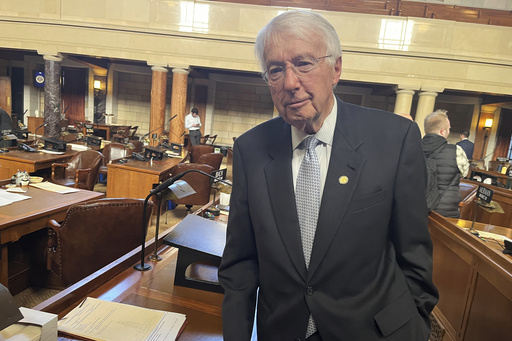
OMAHA, Nebraska — For many years, Republican leaders in Nebraska, a state largely governed by the GOP, have attempted to change the unique way in which Nebraska allocates its presidential electoral votes by congressional district. With another attempt at a winner-take-all bill likely to be unsuccessful, lawmakers are now considering putting the matter to a statewide vote.
The proposed referendum is seen as a fallback option to the winner-take-all legislation, which has been put forward at the request of Republican Governor Jim Pillen. However, it faces strong opposition, including a guaranteed filibuster that may prevent it from passing. Should the bill fail to progress, Senator Myron Dorn has indicated he will work to advance the referendum to the voters in the upcoming 2026 general election.
Efforts to abolish the split electoral vote system have been ongoing since its enactment nearly 35 years ago. Many proponents argue that Nebraska should align itself with the majority of states that utilize a winner-take-all system, where all electoral votes are awarded to a single candidate. Only Maine shares a similar split system with Nebraska. In Nebraska, of the five electoral votes available, three are assigned based on the outcomes in its congressional districts, going to the leading vote-getters in each district.
The state has not selected a Democratic presidential candidate in a statewide election since 1964, and registered Republicans outnumber Democrats by a substantial margin—nearly 2-to-1. However, the 2nd Congressional District, which includes Omaha, has seen Democratic victories in electoral votes, being won by Barack Obama in 2008, Joe Biden in 2020, and Vice President Kamala Harris last year, despite the broader state favoring Republican candidates like Donald Trump.
The push for a winner-take-all system intensified last year when both political parties considered the possibility of a single electoral vote from Nebraska swinging the election outcome. Conservative activists called for changing the Electoral College framework, even suggesting a special election leading up to the general election. However, these efforts were thwarted when a Republican representative from Omaha declined to support the movement, leaving the party short of the votes needed to overcome planned Democratic opposition.
This year, Republicans face similar challenges. While they maintain a significant supermajority of 33 members in the nonpartisan unicameral Legislature, they still require the backing of politicians like Senator Merv Riepe, who represents a mixed political district in Omaha and has stated that he does not support a winner-take-all system. “It’s a poison pill for my district,” Riepe emphasized. “We have larger issues to address this year, and we won’t see a presidential election until 2028.” However, he remained noncommittal on the idea of a popular referendum, expressing a preference for a system that allows other states to adopt a split approach.
Riepe acknowledged that a referendum might be more acceptable to Republican lawmakers in Omaha who could be concerned about alienating Democratic constituents. “A vote from the public could be viewed as a more democratic method,” he remarked. Some of his fellow Republican lawmakers, including Senator Brad von Gillern, have suggested their backing for the referendum based on this reasoning, while others remain uncertain.
During recent public hearings for both proposals, opposition significantly outweighed support. Among the dissenters was Warren Phelps, the chair of the Cheyenne County Republican Party, which is regarded as one of the most rural and conservative areas in the state. He expressed concerns over the winner-take-all approach, fearing that it could disadvantage Republicans in the future as rural populations decline while urban areas like Omaha continue to grow. “As long as the 3rd District in Nebraska holds that electoral vote, we have leverage in the game,” Phelps told lawmakers.
Colin Cole, the director of policy and outreach at a nonprofit organization focusing on equitable democracy, noted that both parties should take heed of this warning. He argued that a winner-take-all system exacerbates polarization among elected officials, undermining compromise and stability in governance. “It leads to highly unstable government,” he asserted. “A minor shift in voter turnout can lead to dramatically different political outcomes, creating starkly contrasting policies from one administration to another.”

